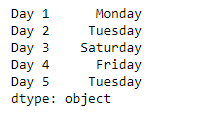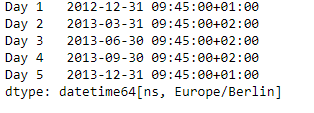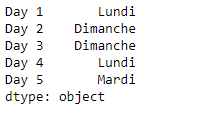Python|熊猫系列.dt.day_name
Series.dt可用于以 datetimelike 的形式访问系列的值并返回多个属性。 Pandas Series.dt.day_name()函数返回具有指定语言环境的 DateTimeIndex 的日期名称。
Syntax: Series.dt.day_name(*args, **kwargs)
Parameter :
locale : Locale determining the language in which to return the day name. Default is English locale.
Returns : Index of day names.
示例 #1:使用Series.dt.day_name()函数返回给定系列对象中基础日期时间数据的日期名称。以英语返回当天的名称。
# importing pandas as pd
import pandas as pd
# Creating the Series
sr = pd.Series(['2012-12-31 08:45', '2019-1-1 12:30', '2008-02-2 10:30',
'2010-1-1 09:25', '2019-12-31 00:00'])
# Creating the index
idx = ['Day 1', 'Day 2', 'Day 3', 'Day 4', 'Day 5']
# set the index
sr.index = idx
# Convert the underlying data to datetime
sr = pd.to_datetime(sr)
# Print the series
print(sr)
输出 :

现在我们将使用Series.dt.day_name()函数返回给定系列对象中每个时间戳的日期名称。
# return day name in english
result = sr.dt.day_name(locale = 'English')
# print the result
print(result)
输出 :

正如我们在输出中看到的, Series.dt.day_name()函数已成功返回指定语言的日期名称。
示例 #2:使用Series.dt.day_name()函数返回给定系列对象中基础日期时间数据的日期名称。以法语返回当天的名称。
# importing pandas as pd
import pandas as pd
# Creating the Series
sr = pd.Series(pd.date_range('2012-12-31 09:45', periods = 5, freq = 'Q',
tz = 'Europe / Berlin'))
# Creating the index
idx = ['Day 1', 'Day 2', 'Day 3', 'Day 4', 'Day 5']
# set the index
sr.index = idx
# Print the series
print(sr)
输出 :

现在我们将使用Series.dt.day_name()函数返回给定系列对象中每个时间戳的日期名称。
# return day name in french
result = sr.dt.day_name(locale = 'French')
# print the result
print(result)
输出 :

正如我们在输出中看到的, Series.dt.day_name()函数已成功返回指定语言的日期名称。